NavSource Online: Submarine Photo Archive
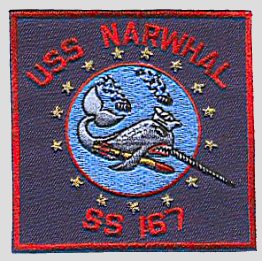
Contributed by Mike Smolinski
Please report any broken links or trouble you might come across to the Webmaster.
Please take a moment to let us know so that we can correct any problems and make your visit as enjoyable and as informative as possible.

| Click On Image For Full Size | Size | Image Description | Source | |
|---|---|---|---|---|
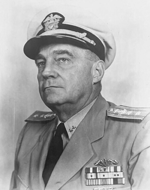 0815400 | 793k | The 1st CO of V-5 (SC-1) was Lt. Cmdr. John H. Brown Jr., who would reach Flag Rank as Vice Admiral and (among other things) was personally responsible for all the points scored (two field goals) in a 6 to 0 victory in the 1913 Army–Navy Game. He would later be named Head of the National Grid Foundation. | Photo & partial text courtesy of wikipedia.org | |
 |
580k | V-5 (SC-1) half finished at Portsmouth Naval Shipyard, 1927. | USN photo courtesy of Robert Hurst. | |
 |
82k | Portsmouth Navy Yard, Kittery, Maine. Waterfront and covered shipways, circa summer-fall 1927. V-4 (SM-1) and V-5 (SC-1) are under construction in inside shipways building. V-4 (SC-1) later renamed Argonaut (SM-1), is on the nearer way and appears to be nearly ready for her launching, which took place on 10 November 1927. V-5 (SC-1) later renamed Narwhal is in a much earlier stage of construction, having been laid down on 10 May 1927. S-13 (SS-118) and another S-boat are alongside the waterfront, at left. Note automobiles parked in the center and right. | USNHC photograph, USNHC # NH 70910. Courtesy of Lieutenant Gustave Freret, USN (Retired), 1970. | |
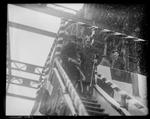 |
1.00k | Mrs. Charles Francis Adams christens the V-5 (SC-1) in Portsmouth, N.H. Navy Yard during blinding snowstorm in Portsmouth, N.H. Navy Yard, 17 December 1929. | Photo courtesy of the Boston Public Library, Leslie Jones Collection via Sean Hert & flickr.com. | |
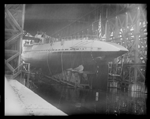 |
916k | Sub V-5 (SC-1) being launched in Portsmouth, N.H. Navy Yard. | Photo courtesy of the Boston Public Library, Leslie Jones Collection via Sean Hert & flickr.com. | |
 |
928k | V-5 (SC-1) starts her slide down the ways at Portsmouth Navy Yard, Portsmouth, N.H., on 17 December 1929. | USN photo courtesy of Scott Koen & ussnewyork.com. | |
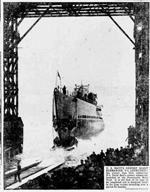 0816727 |
NR | U. S. NAVY'S NEWEST GIANT SUBMARINE, V-5, LAUNCHED The cruiser type fleet submarine, V-5 (SC-1), Uncle Sam's newest submarine, launched at the Portsmouth Navy Yard. It is the first of its type to be completed and is designed chiefly for long cruises extending over a period of months. |
Image and text provided by Connecticut State Library, Hartford, CT. Photo & text by New Britain Herald. [volume] (New Britain, Conn.) 1890-1976, 20 December 1929, Second Section, Image 36, courtesy of chroniclingamerica.loc.gov. |
|
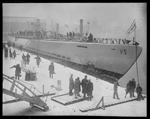 |
989k | Sub V-5 (SC-1) being launched in Portsmouth, N.H. Navy Yard, 17 December 1929. | Photo courtesy of the Boston Public Library, Leslie Jones Collection via Sean Hert & flickr.com. | |
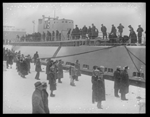 |
654k | V-5 (SC-1) and the snow storm that greeted her launching docked in Portsmouth, N.H. Navy Yard, 17 December 1929. | Photo courtesy of the Boston Public Library, Leslie Jones Collection via Sean Hert & flickr.com. | |
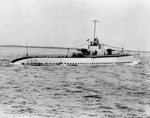 0816730g | 793k | Builders photograph of V-5 (SC-1). | Electric Boat photo courtesy of Dave Way, Historian / Artifact Collections, Pacific Battleship Center | National Museum of the Surface Navy at the Battleship Iowa (BB-61) surfacenavymuseum.org. | |
 |
831k | V-5 (SC-1) bow view from dock, 2 April 1930. | USN photo courtesy of Scott Koen & ussnewyork.com. | |
 |
1.58k | V-5 (SC-1) underway, circa 1930. | USN photo courtesy of Scott Koen & ussnewyork.com. | |
 0816726 |
NR | ITS FIRST SWIM Hailed as the safest craft afloat the U. S. navy's new submarine V-5 (SC-1) is snapped in its preliminary tests off Provincetown, Mass., under the guidance of Lieutenant Commander J. H. Brown, inset. The craft is 371 feet long and there are three escape hatches for emergencies. |
Image and text provided by Connecticut State Library, Hartford, CT. Photo & text by New Britain Herald. [volume] (New Britain, Conn.) 1890-1976, 29 July 1930, Second Section, Image 16, courtesy of chroniclingamerica.loc.gov. |
|
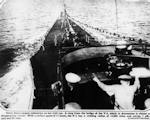 |
NR | Uncle Sam's largest submarine on her trial run. A view from the bridge of the V-5 (SC-1), which in dimensions is almost a disappearing cruiser. With a surface speed of 17 knots, the V-5 has a cruising radius of 15,000 miles and carries 7 officers and 81 men. | Image and text provided by Library of Congress, Washington, DC. Photo & text by Evening Star [volume] (Washington, D.C.) 1854-1972, 03 August 1930, Image 106, courtesy of chroniclingamerica.loc.gov. | |
 |
NR | World’s Safest UNDERSEA CRAFT New Construction Features of the V-5 (SC-1), Include Escape Hatches, Multiple Controls, Three Periscopes, Fume proof Battery Compartment and Mechanical Helsman to Prevent Disaster |
DF Image and text provided by Library of Congress, Washington, DC. Photo & text by Evening Star [volume] (Washington, D.C.) 1854-1972, 07 September 1930, Image 79, courtesy of chroniclingamerica.loc.gov. | |
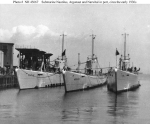 |
94k | Nautilus (SS-168), Argonaut (SS-166); and Narwhal (SS-167); (listed left to right) Tied up together in port, circa the early 1930s. | USNHC photograph NH 45667, courtesy of J.A. Casoly. | |
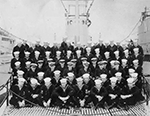 |
202k | Crew of a Barracuda class (SS-163/5) gather on deck for a group picture at Pearl Harbor prior to 1928. The Barracudas had their 5"/51 cal guns replaced in 1928 with smaller 3"/50's. She still has the larger 5"/51 cal gun. The crew is seated on the forward gun deck and the gun itself is raised to its max elevation to give the crew the room to gather. To the right of the boat is the submarine Narwhal (SS-167). | Text courtesy of David Johnston. Photo i.d. courtesy of Dave Decrevel, John Hart, Ric Hedman &David Johnston Photo courtesy of Doug Sheley via flickr.com. |
|
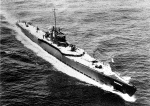 |
109k | Early 1930's photo of the Narwhal (SS-167). She was one of two cruiser submarines inspired by the German U-cruisers of WW I, armed with 6in/53 guns. Her high freeboard reflects great reserve buoyancy. | Text courtesy of U.S. Submarines Through 1945, An Illustrated Design History by Norman Friedman. Naval Institute Press. Photo courtesy of Hyperwar US Navy in WWII. | |
 |
124k | Circa 1931 - 41 photo of the Narwhal (SS-167). | USN photo courtesy of John L. Ross. | |
 |
89k | Barracuda (SS-163) inboard & Narwhal (SS-167) tied up circa early 1930's, possibly at San Francisco. | Photo courtesy of Jerry Crow. | |
 |
1.32k | Submarines at San Pedro July to August 32 Olympics. Inboard from left to right; Narwhal (SS-167), Nautilus (SS-168) & Bass (SS-164). Back of the photo is labeled...to accomadate visitors? |
Photo courtesy of John Pakusich & John Pat via David Way, Curator, Battleship Iowa BB 61, Pacific Battleship Center,250 S. Harbor Blvd., Berth 87, San Pedro, CA 90731 | |
 0816802r |
1.10k | Holland (AS-3) at anchor in the harbor at San Diego, CA., 10 November 1932, with Nautilus (SS-168), Narwhal (SS-167) and Bass (SS-164) alongside. | US National Archives photo # 80G-463339, a US Navy photo now in the collections of the US National Archives courtesy of Rick Davis, Mike Brock via Gary Priolo. | |
 |
83k | Tender and submarines at dock in Juneau, Alaska, July, 1934. At far left, tender Holland (AS-3), submarines (l to r) Bass (SS-164), Bonita (SS-165), Barracuda (SS-163), Nautilus (SS-168) and Narwhal (SS-167). The mill of the Alaska Juneau Gold Mining Company is in the background. | Photo by Winter & Pond courtesy of the Alaska State Library. Submitted by Joseph M. Radigan (of blessed memory) | |
 | 417k | Holland (AS-3) with seven submarines alongside, in San Diego harbor, California, possibly around 24 December 1934. The submarines are (from left to right): Cachalot (SS-170); Dolphin (SS-169); Barracuda(SS-163); Bass (SS-164); Bonita (SS-165); Nautilus (SS-168); and Narwhal (SS-167) | USN photo courtesy of Scott Koen & ussnewyork.com. | |
 |
NR | Submarine Rescues Distressed Navy Plane. The Narwhal (SS-167), one of the world's most powerful submarines, photographed as it went to the rescue of a distressed Navy plane off the coast of Southern California and towed it to San Diego. This photograph was taken by the Navy and released at San Diego yesterday. |
Insert photo via Robert Hurst. Image and text provided by Library of Congress, Washington, DC. Photo & text by Evening Star [volume] (Washington, D.C.) 1854-1972, 24 March 1935, Image 3, courtesy of chroniclingamerica.loc.gov. |
|
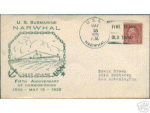 |
78k | Commemorative postal cover marking Narwhal's (SS-167) fifth anniversary of commissioning, 15 May 1935. | Courtesy of Jack Treutle (of blessed memory). | |
 |
78k | Commemorative postal cover marking: Bass (SS-164); Dolphin (SS-169); Porpoise (SS-172); Argonaut (SS-169); Nautilus (SS-168); Cuttlefish (SS-171) Barracuda (SS-163); Narwhal (SS-167) Bonita (SS-165); & Cachalot (SS-170) on Navy Day, 27 October 1935. |
Courtesy of Jack Treutle (of blessed memory). | |
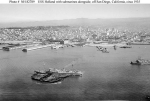 |
94k | Holland (AS-3)
in San Diego harbor, California, circa 1935. Submarines alongside are (from outboard to inboard): Cachalot (SS-170); Barracuda(SS-163); Bass (SS-164); Bonita (SS-165); Nautilus (SS-168); and Narwhal (SS-167). Closest ship in the nest of destroyers at far right is Yarnall (DD-143). |
Photograph NH # 82789, from the Bureau of Ships Collection in the U.S. National Archives. | |
 |
35k | Commemorative postal cover & photo inset marking Narwhal 's (SS-167) arrival at Pearl Harbor, 17 August 1936. |
Courtesy of Jack Treutle (of blessed memory). | |
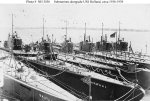 |
119k | Holland (AS-3) circa 1936-1939, with seven submarines alongside, circa 1936-1939.
These "boats" are, from left to right: Nautilus (SS-168); Narwhal (SS-167); Shark (SS-174), marked "P3"; Dolphin (SS-169), marked "D1"; Porpoise (SS-172), marked "P1"; Pike (SS-173), marked "P2"; and Tarpon (SS-175), marked "P4". |
Photo NH # 3036, courtesy of U.S. Naval Historical Center. | |
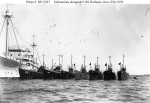 |
82k | Holland (AS-3) circa 1936-1939,
with seven submarines alongside, circa 1936-1939. These "boats" are, from left to right: Nautilus (SS-168); Narwhal (SS-167); Shark (SS-174), marked "P3"; Dolphin (SS-169), marked "D1"; Porpoise (SS-172), marked "P1"; Pike (SS-173), marked "P2"; and Tarpon (SS-175), marked "P4". |
Photo NH # 3037, courtesy of U.S. Naval Historical Center. | |
 |
90k | Holland (AS-3) circa 1936-1939,
with seven submarines alongside, circa 1936-1939. These "boats" are, from left to right: Nautilus (SS-168); Narwhal (SS-167); Shark (SS-174), marked "P3"; Dolphin (SS-169), marked "D1"; Porpoise (SS-172), marked "P1"; Pike (SS-173), marked "P2"; and Tarpon (SS-175), marked "P4". |
Photo NH # 3038, courtesy of U.S. Naval Historical Center. | |
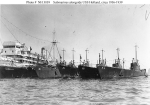 |
96k | Holland (AS-3) circa 1936-1939,
with seven submarines alongside, circa 1936-1939. These "boats" are, from left to right: Nautilus (SS-168); Narwhal (SS-167); Shark (SS-174), marked "P3"; Dolphin (SS-169), marked "D1"; Porpoise (SS-172), marked "P1"; Pike (SS-173), marked "P2"; and Tarpon (SS-175), marked "P4". |
Photo NH # 3039, courtesy of U.S. Naval Historical Center. | |
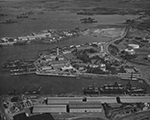 |
1.14k | Aerial view of the Submarine Base, Pearl Harbor, Oahu, Hawaii,
with part of the supply depot beyond and the fuel farm at right, looking north on 13 October 1941.
Note the fuel tank across the road from the submarine base, painted to resemble a building.
The building beside the submarine ascent tower (in left center, shaped like an upside-down "U") housed the U.S. Fleet Headquarters at the time of the Japanese attack on 7 December 1941. Office of Admiral Husband E. Kimmel, the Fleet's Commander in Chief, was in the upper left corner of the building's top floor. Wharton (AP-7) is in right foreground. Among the submarines at the base are Tuna (SS-203), Gudgeon (SS-211), Argonaut (SS-166), Narwhal (SS-167), Triton (SS-201) and Dolphin (SS-169). Holland (AS-3) and Niagara (PG-52) are alongside the wharf on the base's north side. In the distance (nearest group in upper left) are the battleship Nevada (BB-36), at far left, Castor (AKS-1) and the derelict old mine-layer Baltimore. Cruisers in top center are Minneapolis (CA-36), closest to camera, and Pensacola (CA-24), wearing a Measure 5 painted "bow wave". |
Text from USN photo # 80-G-451125, now in the collections of the National Archives. USN photo # 80-G-651517 from NARA, College Park, Maryland, courtesy of Sean Hert. |
|
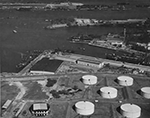 |
1.07k | Two additional aerial views of the Submarine Base, Pearl Harbor, Oahu, Hawaii, with part of the supply depot beyond and the fuel farm at right, looking north on 13 October 1941. | USN photo # 80-G-651516 & 651518 from NARA, College Park, Maryland, courtesy of Sean Hert. | |
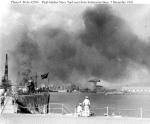 |
64k | Pearl Harbor attack, 7 December 1941, looking toward the Navy Yard from the Submarine Base during the attack. Submarine in the left foreground is Narwhal (SS-167). In the distance are several cruisers, with large cranes and 1010 Dock in the right center. Note Sailors in the center foreground, wearing web pistol belts with their white uniforms. | Submitted by Scott Baker, US National Archives photo # 80-G-32704, a USN photo now in the collections of the US National Archives. | |
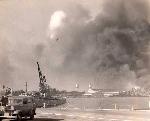 |
28k | Another view of the Pearl Harbor attack, looking toward the Navy Yard from the Submarine Base. Narwhal (SS-167) is at left secured to a dock. Notice the Japanese plane overhead. | USN photo submitted by John Hummel, USN (Retired). | |
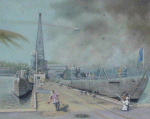 |
53k | Oil/alkyd on canvas by the artist John Meeks entitled "Pearl". Just a few minutes after America's unexpected and violent entry World War II, this painting depicts the scene at the submarine base with Dolphin (SS-169) (to the left) and Narwhal (SS-167) acquitting themselves to the best of their abilities, and honorably, during the first wave of the attack. In the background, a pall of smoke rises from the disaster that has befallen "Battleship Row" and the Navy Yard, and Japanese "Kate" torpedo bombers race in from the south to add to the mayhem. A lone "Kate", its torpedo already spent, circles - perhaps to take photographs. As it crosses astern of the moored submarines, their hastily prepared anti-aircraft fire scores a hit and it sustains fatal damage. Credit for the 'kill' is shared by Narwhal, Tautog (SS-199) and a destroyer (- although in detailed battle reports, the skipper of Dolphin claims the victory...). |
Photo & text courtesy of subart.net. | |
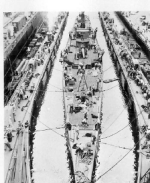 |
50k | ARD-8 overhead view with Narwhal (SS-167) in her dock, date unknown, probably at Pearl Harbor. | Photo courtesy of Susan Bloom for her uncle Raymond Rucker USS ARD-8. Photo i.d. courtesy of Ric Hedman. | |
 |
97k | Narwhal (SS-167) was, in effect, a cruiser version of Argonaut (SS-166) but without the special mine tubes. She is shown, as modified during WW II, with superstructure platforms for 20-mm guns & wartime-type open periscope shears. Note how her ship's boats were recessed into the deck forward of her 6-in guns. The added torpedo tubes under the deck guns are indicated in the plan view. As in Argonaut, pumps and the forward (battery-charging) engines occupied the spaces below the control room, which had a galley at its fore end. Abaft the control room were the crew's mess & CPO quarters above the after battery and the after 6-inch magazine. Officer's quarters were above the forward battery & the forward 6-in magazine. In contrast to Argonaut , the maneuvering room was moved aft, above the motor room, which was abaft the big engine room. The small space abaft it, forward of the after torpedo room, was crew's quarters. The crew was also accommodated in the space between the forward torpedo room and the officer's quarters. |
Photo & text courtesy of U.S. Submarines Through 1945, An Illustrated Design History by Norman Friedman. Naval Institute Press. | |
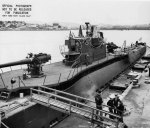 |
164k | Plan view aft of the Narwhal (SS-167) shows war modifications in these Mare Island photographs taken on 28 March 1943. Circled changes include two external tubes forward, several 20-mm antiaircraft guns, & masts for SJ (forward) & SD (aft) radars. The boat was also fitted with external stern tubes right aft. | USN photo # 2093-43, courtesy of Darryl L. Baker. Text courtesy of U.S. Submarines Through 1945, An Illustrated Design History by Norman Friedman. Naval Institute Press. | |
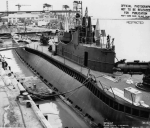 |
179k | Narwhal (SS-167) shows war modifications in these Mare Island photographs taken on 28 March 1943. Circled changes include two external tubes forward, several 20-mm antiaircraft guns, & masts for SJ (forward) & SD (aft) radars. The boat was also fitted with external stern tubes right aft. | USN photo # 2094-43, courtesy of Darryl L. Baker. Text courtesy of U.S. Submarines Through 1945, An Illustrated Design History by Norman Friedman. Naval Institute Press. | |
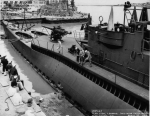 |
166k | Mare Island workers are conducting an inclining experiment on the Narwhal (SS-167) on 28 March 1943. | USN photo # 2095-43, courtesy of Darryl L. Baker. | |
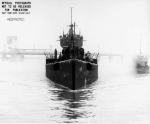 |
90k | Bow view of the Narwhal (SS-167) in the Mare Island channel on 3 April 1943. | USN photo # 2307-43, courtesy of Darryl L. Baker. | |
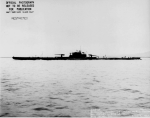 |
90k | Narwhal (SS-167), as modified, shown here on 3 April 1943 off Mare Island. Her SD radar mast is raised. Note the external tubes forward & right aft. The boat was also fitted with external stern tubes right aft. | USN photo # 2309-43, courtesy of Darryl L. Baker. Text courtesy of U.S. Submarines Through 1945, An Illustrated Design History by Norman Friedman. Naval Institute Press. | |
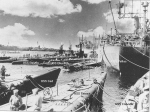 |
101k | Busy pier scene at Fremantle Australia19 December 1943. From left to right, stern view to the camera are the Bonefish (SS-223), Rasher (SS-269), Bowfin (SS-287), Bluefish (SS-222), Narwhal (SS-167) and the sub tender Pelias (AS-14). Second row, bow view are the Cod (SS-224), Tinosa (SS-283) and Crevalle (SS-291). I believe the only time that photo could have been taken was 19 December 1943. The Tinosa was in Fremantle only once, from 16 December 1943 to 10 January 1944. During that brief window, the Bonefish had not arrived until 19 December and the Rasher departed 19 December so that is the single date all three submarines were ever in Fremantle port at the same time. | Photo i.d. courtesy of Dan Goodell. USN photo courtesy of Ric Hedman. |
|
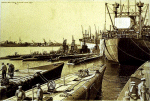 |
74k | A 1944 Charcoal drawing by the artist Griffith Baily Coale entitled "Busy Fremantle--Busy Mother" is reminiscent of the above photo by Lt. Herb Hanson. | Painting # 40 / 88-188-AN. Courtesy of the USNHC. |
|
 |
38k | 3 March 1944:20 miles NE of Dapitan, Mindanao. Cdr (later KIA on Lagarto (SS-371) Frank D. Latta's Narwhal (SS-167) torpedoes Karatsu [ex-U.S. river gunboat Luzon (PR-7)]at 08-55N, 123-20E. The torpedo blows Karatsu's bow off back to the bridge. Narwhal is heavily depth charged, but undamaged. Karatsu is towed to Cebu and later towed to Manila for repairs. Her repairs commence at the No. 103 Repair Facility at Cavite. | Text courtesy of combinedfleet.com via Tommy Trampp. U.S. Naval Institute photo,Dudley Knox Library Naval Postgraduate School, Monterey Ca.,Yangtze River Patrol Memorial Exhibit. |
|
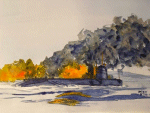 |
65k | Watercolor on paper by the artist Perry Stirling entitled "Narwhal (SS-167). This painting shows her on her 12th war patrol in June, 1944, when she surfaced off Bula Ceram island in the South Pacific, and pounded the gasoline storage facilities and pumping station with 56 rounds from her 6-inch guns, leaving the facilities ablaze. |
Photo & text courtesy of subart.net. | |
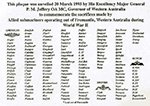 |
365k | This plaque was unveiled 20 March 1995 by His Excellency Major General P.M. Jeffery OA MC, Governor of Western Australia to commemorate the sacrifices made by Allied submarines that operated out of Fremantle, Western Australia during WW II. | Photo courtesy of Ron Reeves (of blessed memory). | |
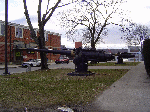 |
283k | Narwhal 's (SS-167) deck guns at NSB New London, CT., March 2009. | Photo courtesy of David Johnston. | |
| Back To The Main Photo Index | Back To the Submarine Index |
|
Problems and site related matters, E-mail Webmaster |
|
This page is created and maintained by Michael Mohl All Pages © 1996 - 2025 NavSource History |